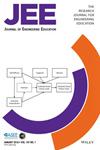Teacher Empathy in an engineering classroom: Exploring the growth in perception of Teacher Empathy through the journey of three engineering faculty members
Abstract
Background
In higher education, Teacher Empathy is a term that refers to the empathetic skills of teachers. Researchers in other disciplines have shown that Teacher Empathy reduces teacher burnout and improves teacher satisfaction and student performance. There is little research on Teacher Empathy within engineering education.
Purpose
In our current study, we explored the potential changes in perception of Teacher Empathy among three engineering faculty members as they utilized empathetic actions while teaching second-year engineering courses. Understanding the experiences of faculty members will help us to implement and further explore Teacher Empathy in engineering education.
Method
Teacher Action Research methodology helped us provide agency to our three participants and research with them instead of on them. We used a combination of values coding and simultaneous coding for data analysis.
Findings
Improved confidence in their empathetic skills was observed for two participants as they showed positive evolution of their perception about Teacher Empathy. The other participant increased the number of empathetic approaches he used in his classroom.
Conclusion
Reduced teacher burnout, improved teacher satisfaction, and better student performance were some of the major benefits of Teacher Empathy that emerged. The difference in the evolution of each participant's perception about Teacher Empathy indicated that the personality of a faculty member has an influence on implementation and success of Teacher Empathy.

 求助内容:
求助内容: 应助结果提醒方式:
应助结果提醒方式:


